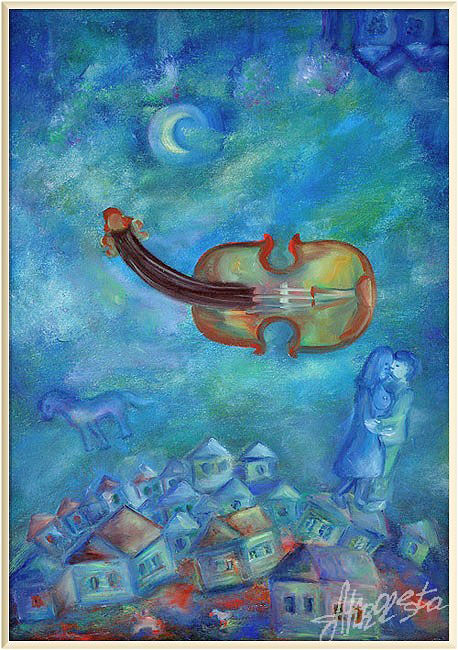Marc Chagall"s violin

Oil, canvas, 50x70. 2017-2018
Marc Chagall created his own unique style combining sadness and fun, flying
people and a violinist dancing on doll houses. Chagall"s world could easily turn
upside down, goats and chickens could walk across the sky.
Chagall"s paintings are akin to poems written by brushes and paints on canvas.
"Marc Zakharovich Chagall (born Moishe Zakharovich Shagal 1887 – 1985) was a
Russian-French artist of Belarusian Jewish origin. An early modernist, he was
associated with several major artistic styles and created works in virtually
every artistic format, including painting, book illustrations, stained glass,
stage sets, ceramic, tapestries and fine art prints.
Art critic Robert Hughes referred to Chagall as "the quintessential Jewish
artist of the twentieth century" (though Chagall saw his work as "not the dream
of one people but of all humanity").
He had two basic reputations, writes Lewis: as a pioneer of modernism and as a
major Jewish artist. He experienced modernism"s "golden age" in Paris, where "he
synthesized the art forms of Cubism, Symbolism, and Fauvism, and the influence
of Fauvism gave rise to Surrealism". Yet throughout these phases of his style
"he remained most emphatically a Jewish artist, whose work was one long dreamy
reverie of life in his native village of Vitebsk." "When Matisse dies," Pablo
Picasso remarked in the 1950s, "Chagall will be the only painter left who
understands what colour really is."
It was not until 1927 that Chagall made his name in the French art world, when
art critic and historian Maurice Raynal awarded him a place in his book Modern
French Painters. However, Raynal was still at a loss to accurately describe
Chagall to his readers:
Chagall interrogates life in the light of a refined, anxious, childlike
sensibility, a slightly romantic temperament ... a blend of sadness and gaiety
characteristic of a grave view of life. His imagination, his temperament, no
doubt forbid a Latin severity of composition.
Chagall developed a whole repertoire of quirky motifs: ghostly figures floating
in the sky, ... the gigantic fiddler dancing on miniature dollhouses, the
livestock and transparent wombs and, within them, tiny offspring sleeping upside
down. The majority of his scenes of life in Vitebsk were painted while living in
Paris, and "in a sense they were dreams", notes Lewis. Their "undertone of
yearning and loss", with a detached and abstract appearance, caused Apollinaire
to be "struck by this quality", calling them "surnaturel!" His "animal/human
hybrids and airborne phantoms" would later become a formative influence on
Surrealism. Chagall, however, did not want his work to be associated with any
school or movement and considered his own personal language of symbols to be
meaningful to himself. But Sweeney notes that others often still associate his
work with "illogical and fantastic painting", especially when he uses "curious
representational juxtapositions". Sweeney writes that "This is Chagall"s
contribution to contemporary art: the reawakening of a poetry of representation,
avoiding factual illustration on the one hand, and non-figurative abstractions
on the other". André Breton said that "with him alone, the metaphor made its
triumphant return to modern painting." (Wiki)
Exhibitions:
Personal exhibition "JazzArt". 2018. Lithuania. EU.
Personal exhibition "SmartArt". 2021. Lithuania. EU.
Personal exhibition Ironic homage. 2021. Ukmerge, Lithuania.
Media:
In search of meaning. Above Art Magazine. 16 Jan 2019 (Illustration)
The history of art in Akrolesta’s paintings. Homsk media. 17 April 2019.
(Illustration)
JazzArt - improvisations on the themes of the great painters. Discours magazine.
23 April 2019 (Illustration)
The history of art in Akrolesta’s paintings. Miscellany Artifex. 24 April 2019
(Illustration)
Worlds of Akrolesta. Culture and art 14 May 2019 (Illustration)
The constellation Akrolesta. Syg.ma. 19 May 2019 (Illustration)
Treasures of Akrolesta. Homsk. 20 May 2019 (Illustration)
From the history of painting. Culture and art. 10 July 2019 (Illustration)
Mirror for the viewer. Syg.ma. 18 August 2019 (Illustration)
Interview with Akrolesta. In search of meaning. Medium. 23 august 2019.
(Illustration)
Akrolesta’s collections. Teletype. 24 August 2019. (Illustration)
Art Stories from Akrolesta. Syg.ma. 7 September 2019 (Illustration)
Bendravimo būdas, kuriam nereikia vertėjo. Vilkmerge. 2021-04-03 (Illustration)
Smart art by Akrolesta: art is communication that doesn't need translation. DELFI. March 28, 2021 (Illustration)
Price
1200 EUR
